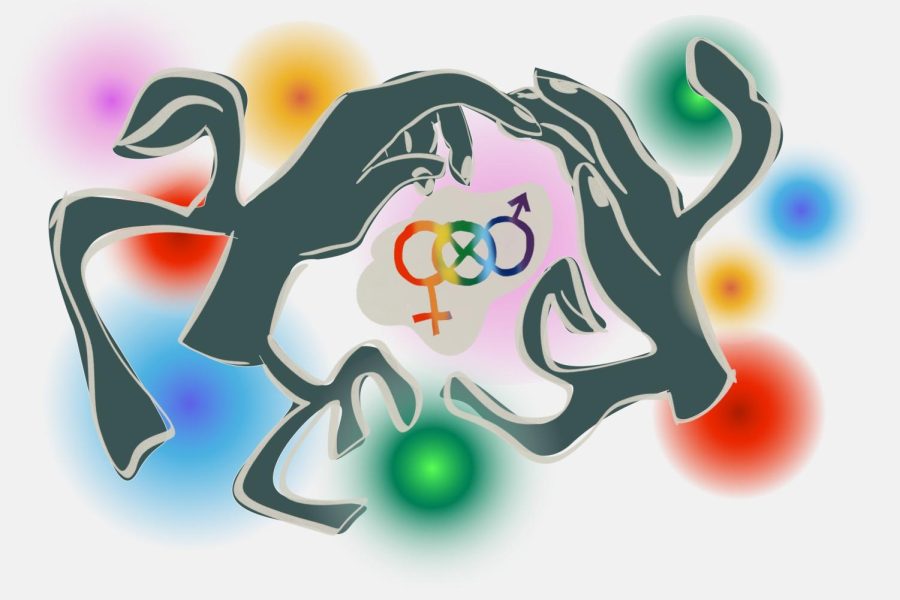Sexuality is a wide spectrum, don’t feel pressured to label yourself
March 9, 2023
I have always struggled with my sexuality, even when I was too young to truly understand it.
I have distinct memories from sixth grade of various people telling me I must be gay, or at least bisexual, just because of the way I acted or the clothes I wore.
These comments created a lot of confusion in me because I hadn’t even felt sexual attraction yet—I was only eleven. I couldn’t make sense of my peers’ tendencies to label or stereotype me.
About 25% of young adults have reported they have felt some kind of sexual thought or desire between the ages of 11-12, according to a July 14, 2014 article by the National Library of Medicine.
I was not among this 25% of people. In fact, I think one of the reasons I felt sexual feelings much later than others was because everyone weighing in on my sexuality at such a young age left me constantly questioning myself.
In elementary and middle school, we develop “crushes” on people that we often know little to nothing about. This attraction is not based on anything real but rather on superficial qualities, according to a Feb. 10, 2011 Psychology Today article.
Having my peers tell me who I should feel attraction towards at such a young age based only on stereotypes permanently altered my perspective of myself and my sexuality.
My constant confusion and shifting feelings of attraction towards people of any gender has left me unable to label my own sexuality, which I don’t see as a problem. While many find comfort and stability with labels, I find them to be immensely overwhelming.
My attraction to someone is based on qualities unrelated to gender, such as their sense of humor or whether I can feel comfortable around them. When I would try to explain this to someone their first response would often be, “oh, so you’re bi.” But that never really felt right to me.
Part of my disconnect from bisexuality came from my level of attraction towards different genders changing so much. I have called myself bi in the past because it was easier to explain to others rather than going into the deep depths of my sexual confusion, but I would always feel like an imposter.
Queer imposter syndrome is a psychological phenomenon of self-doubt that causes one to feel like a fraud, which can apply to any queer person who feels they are not “queer” enough for their label, according to an Oct. 2, 2022 article by Shape.
My constant self-doubt left me so uncomfortable with myself. I felt like a liar every time someone asked what my sexuality was. I have been attracted to both men and women so I would have to be bi, right?
An attraction to both men and women does not mean you have to identify as bisexual or pansexual.
The moment I removed the pressure of labeling myself and decided that I simply didn’t align with any particular sexuality, I felt so much lighter.
Personally, I like the fluidity of not labeling. I feel less stress over sexual or romantic attraction because I don’t feel like I am supposed to sway more heavily towards one side to fit a label.
Various celebrities share this view and have said publicly that labels just aren’t really for them, such as Miley Cyrus, Keke Palmer and Kit Connor.
In fact, Connor was bullied on the internet into come out as bi after he was accused of “queer-baiting” for playing a bi character on the Netflix Original show “Heartstopper,” according to a Nov. 1, 2022 TIME article.
One’s sexuality should never be made a spectacle of on the internet, especially that of a teenager who is just starting to figure out their identity.
How one decides to label or not label their sexuality should never require input from others, as it just opens more doors for self-doubt.
Trying to convince someone they are a certain sexuality just because they fit a certain stereotype can potentially be very damaging.
Labels can set up unrealistic expectations that can limit a person because of incorrect stereotypes, according to a Dec. 2, 2020 LinkedIn article.
One’s identity is supposed to serve as a safe haven—to feel fully comfortable with any label or the absence of one, we must first come to terms with our identity on our own.
Figuring out your sexual preferences should never be overly stressful, and fluidity makes the process much more manageable. Even if you’ve done all the exploring you need and still don’t feel at home in a label, embrace it.
Being unlabeled is not the bridge you take to finally reach the sexuality you’ve been searching for.
Labels can be empowering for some, but not all minds or sexuality roadmaps look the same. Everyone’s minds are wired differently, meaning they find comfort in different ways.
The easiest way for me to accept who I am and who I like was to let go of labels and the pressure that comes along with them. I chose to focus on who I am attracted to rather than why I am attracted to them.
I get the appeal of wanting a label. However, I’ve just never been able to find one I feel at ease in, and that’s okay. Whether you decide to label yourself or not, never feel pressured by others or stereotypes to fit into a certain box.
